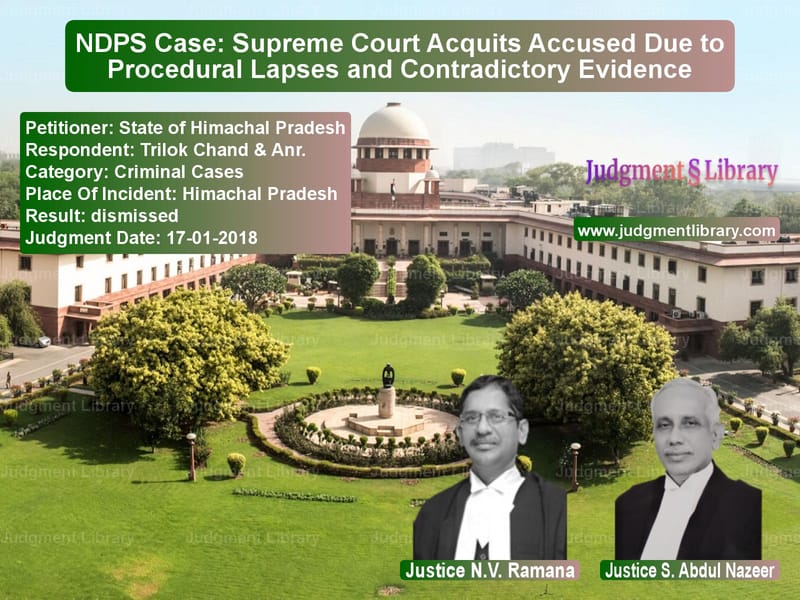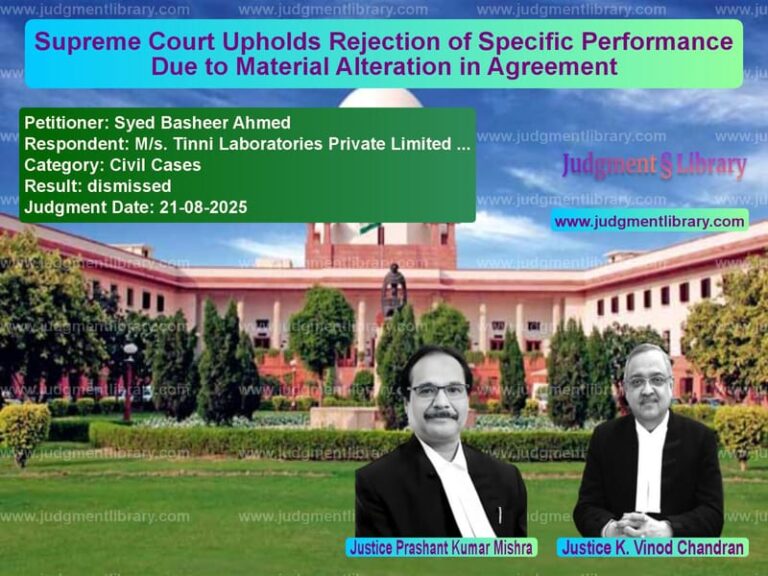NDPS Case: Supreme Court Acquits Accused Due to Procedural Lapses and Contradictory Evidence
The Supreme Court of India, in its judgment on January 17, 2018, ruled on a case concerning the conviction of two accused under the Narcotic Drugs and Psychotropic Substances Act (NDPS Act). The case, State of Himachal Pradesh v. Trilok Chand & Anr., revolved around the alleged recovery of charas from the accused. The Court upheld the Himachal Pradesh High Court’s decision, which had overturned their conviction due to inconsistencies in the prosecution’s evidence.
Background of the Case
The case arose on July 10, 2004, when a team of police officers, acting on a tip-off, intercepted two individuals near Panarsa Bridge, Himachal Pradesh. Upon their arrival, the police reportedly found them carrying three gunny bags containing charas. The accused allegedly tried to flee but were apprehended. The contraband was seized, samples were prepared, and a case was registered.
The trial court convicted both accused under Section 20 of the NDPS Act, sentencing them to 10 years of rigorous imprisonment and a fine of Rs. 1,00,000 each. In default of payment, they were to undergo an additional two years of imprisonment.
However, the Himachal Pradesh High Court overturned the trial court’s decision, citing discrepancies in the prosecution’s evidence. Dissatisfied, the State of Himachal Pradesh filed an appeal before the Supreme Court.
Arguments by the Appellant (State of Himachal Pradesh)
The State contended that:
- The High Court had unduly emphasized minor inconsistencies in the prosecution’s case while ignoring substantive evidence.
- Prosecution witnesses, particularly the police officials, had clearly established the guilt of the accused.
- The recovery of contraband was properly documented, and the prosecution’s case was legally sound.
Arguments by the Respondents (Accused)
The defense countered that:
- The case was fabricated, and the accused were falsely implicated.
- Independent witnesses did not support the prosecution’s version of events.
- There were significant contradictions in the statements of prosecution witnesses, particularly regarding the time and place of the alleged seizure.
- The police failed to follow proper legal procedures, raising doubts about the legitimacy of the case.
Observations of the Supreme Court
The Supreme Court identified several discrepancies and procedural lapses in the prosecution’s case:
- “The evidence of Tulsi Ram (DW 2) makes it clear that on the day of the incident, he was asked by police officials to transport three gunny bags from an abandoned house, rather than from the accused.”
- “Independent witnesses (PW 1 Amar Chand and PW 2 Kuldip Kumar) did not support the prosecution and stated they were not present at the scene during the alleged seizure.”
- “The police officers provided conflicting testimonies regarding the time and place of seizure, the procedure followed, and the handling of contraband.”
- “The police claimed to have borrowed a weighing scale from a shopkeeper, but the shopkeeper’s statement contradicted their timeline.”
- “The mandatory safeguards under the NDPS Act, which require strict compliance in search and seizure procedures, were not adequately followed.”
Referring to precedent cases, the Supreme Court reiterated:
- “It is imperative that in NDPS cases, the prosecution’s evidence must be scrutinized with extra caution since the punishment prescribed is severe.”
- “Any procedural lapse in search, seizure, or handling of contraband creates reasonable doubt, which must benefit the accused.”
- “Minor discrepancies in witness testimonies can be ignored, but major contradictions, such as conflicting statements from key witnesses, are fatal to the prosecution’s case.”
Final Verdict
The Supreme Court dismissed the State’s appeal, affirming the High Court’s ruling. The Court held that:
- The prosecution failed to establish the accused’s guilt beyond a reasonable doubt.
- There were significant lapses in the investigation, including contradictory witness statements and procedural non-compliance.
- The accused deserved the benefit of the doubt, and their acquittal by the High Court was justified.
Conclusion
This judgment reinforces the principle that convictions under the NDPS Act require strict adherence to procedural safeguards. The Court’s decision highlights the necessity of reliable, consistent, and legally compliant evidence in cases involving serious criminal charges.
Don’t miss out on the full details! Download the complete judgment in PDF format below and gain valuable insights instantly!
Download Judgment: State of Himachal Pr vs Trilok Chand & Anr. Supreme Court of India Judgment Dated 17-01-2018.pdf
Direct Downlaod Judgment: Direct downlaod this Judgment
See all petitions in Drug Possession Cases
See all petitions in Bail and Anticipatory Bail
See all petitions in Judgment by N.V. Ramana
See all petitions in Judgment by S. Abdul Nazeer
See all petitions in dismissed
See all petitions in supreme court of India judgments January 2018
See all petitions in 2018 judgments
See all posts in Criminal Cases Category
See all allowed petitions in Criminal Cases Category
See all Dismissed petitions in Criminal Cases Category
See all partially allowed petitions in Criminal Cases Category







